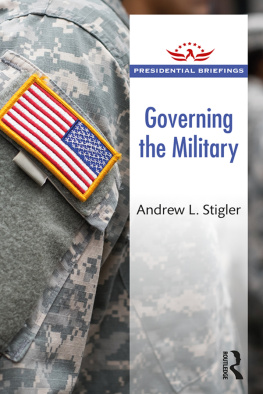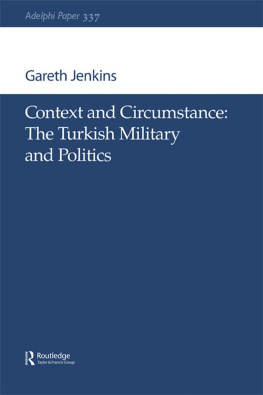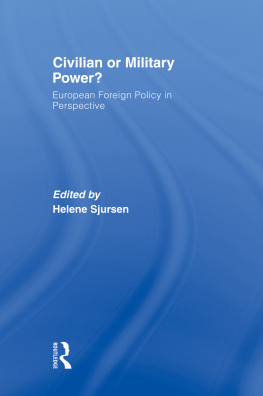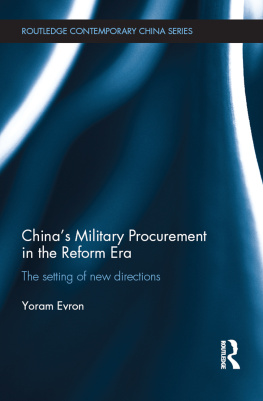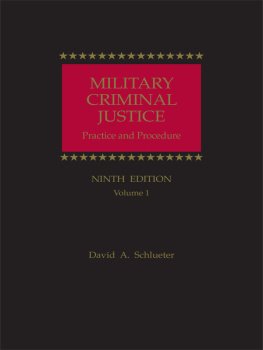Governing the Military
A military is the most significant tool of a nations foreign policy, and (hopefully) the tool of last resort. Yet the control a civilian leader has over the military is, in many respects, an encumbered and fractured control. The militarys organizational culture, role in society, size, and considerable autonomy are potential obstacles to true civilian control over the military, even in peacetime. A brief but historically informed text intended for students of the presidency or national security, Governing the Military addresses the gamut of challenges a new U.S. President faces as commander-in-chief.
Andrew L. Stigler is Associate Professor of National Security Affairs at the United States Naval War College.
Presidential Briefings
Series Editor: Robert J. Spitzer,
State University of New York College at Cortland
The Presidential Briefings series provides concise and readable introductions to topics of concern to those who have been and will be President of the United States. For students of the presidency, these books provide a highly practical and accessible overview of an important subject related to the presidency. By approaching their subjects from the vantage point of what a president needs to know, and what the citizenry need to know about the presidency, these books are authoritative and significant works.
Robert J. Spitzer is Distinguished Service Professor and Chair of the Political Science Department at the State University of New York College at Cortland, as well as Visiting Professor at Cornell University. He led the Presidents and Executive Politics Organization (formerly the Presidency Research Group) of the American Political Science Association from 200103, and he is a regular contributor to various media outlets.
Governing the Military
Andrew L. Stigler
Presidential Relations with Congress
Richard S. Conley
For more information about this series, please visit www.routledge.com/Presidential-Briefings-Series/book-series/PBSTRANS
Governing the Military
Andrew L. Stigler
First published 2019
by Routledge
711 Third Avenue, New York, NY 10017
and by Routledge
2 Park Square, Milton Park, Abingdon, Oxon, OX14 4RN
Routledge is an imprint of the Taylor & Francis Group, an informa business
2019 Taylor & Francis
The right of Andrew L. Stigler to be identified as author of this work has been asserted by him in accordance with sections 77 and 78 of the Copyright, Designs and Patents Act 1988.
All rights reserved. No part of this book may be reprinted or reproduced or utilised in any form or by any electronic, mechanical, or other means, now known or hereafter invented, including photocopying and recording, or in any information storage or retrieval system, without permission in writing from the publishers.
Trademark notice: Product or corporate names may be trademarks or registered trademarks, and are used only for identification and explanation without intent to infringe.
Library of Congress Cataloging-in-Publication Data
A catalog record for this book has been requested
DISCLAIMER: The views expressed are solely those of the author, and should not be attributed to any U.S. Government department or agency.
ISBN: 978-1-138-48977-6 (hbk)
ISBN: 978-1-138-48978-3 (pbk)
ISBN: 978-1-351-03678-8 (ebk)
Typeset in Bembo
by Apex CoVantage, LLC
For
Stephen and Virginia Stigler
with love and gratitude
One of the tremendous advantages of teaching at the Naval War College has been the opportunity to become acquainted with a wide array of officers from all four services, as well as civilian national security officialsindividuals possessing a great diversity of experiences, perspectives, and expertise. Of the countless interactions I have had with war college students and colleagues over more than a decade, one is of particular relevance for this book. As one might imagine, following a presidential election that designates a new chief executive, the Pentagon prepares a series of briefings for the incoming occupant of the oval office. These briefings cover a wide range of topicsthe United States defensive capabilities, the capabilities and disposition of adversaries, the status of ongoing operations, and anything else the nations most senior uniformed leadership believes the new president needs to know.
My student was involved in this series of briefings, and was present while the president-elect received a well-prepared avalanche of information. What he most vividly remembered from the episode was that the president-elect uttered a single phrase with considerable frequency: I had no idea.
The president-elects surprise should come as no surprise. It has been expected since the nations founding that the president would need to maintain a level of secrecy in international affairs, even from cabinet members and the vice president. Shortly after taking office, George Washington asked for a secret service fund in his first message to Congress. He was soon granted his request, a fund to conduct clandestine operations without Congressional oversight.
Even in wartime, presidents left close advisors uninformed about important programs and developments. Harry Truman, when he assumed the presidency following the death of Franklin Roosevelt, discovered he had been completely uninformed about a range of wartime programsincluding the United States effort to develop the worlds first atomic bomb.
Presidents-elect are forced to simultaneously familiarize themselves with a vast ocean of information at the same time that they take the reins of one of the worlds largest bureaucracies. Though we speak of civilian control of the military in the United States (and the phrase is by and large an accurate one), it is also true that the military bureaucracy and officer corps have their own perspectives on what measures are necessary to secure the nation, and avenues through which to express those perspectives when they differ with those of the president. The military also has a broad and solid base of support in the country. These factors can conspire to complicate and even frustrate a presidents efforts to shape or utilize the military instrument of power.
This book addresses the most important issues that can confront a president seeking to steer the militarys course in the domestic and international arenas, issues that informed citizens need to understand as well. The framers of the Constitution left to the citizens of the new American democracy the task of evaluating, through elections, the tenure of president. What perhaps receives too little attention is the fact that arriving at a well-cast vote is a decision best based on sound knowledge of the chief executives powers and responsibilities. Given the wide latitude a president enjoys in the execution of his or her commander-in-chief responsibilities, there is considerable room to argue that the presidents national security role should be of primary concern when casting a ballot. Its foreign policy, stupid, might be a more accurate recasting of a former presidents campaign slogan, at least from the standpoint of what a president genuinely controls. This book offers an exploration of the range of considerations that a president faces as he or she prepares to govern the military.

